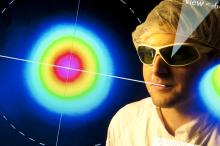Model will unlock mysteries of the voice
CERN inaugurates a scientific tourist trail
On 2 June 2013 CERN will be inaugurating a scientific tourist trail known as the Passport to the Big Bang. A major programme of activities has been organised for the general public at various CERN sites, including special events and bike rides. The trail through the local countryside, between 10 exhibition platforms located at 10 different CERN sites, will follow the course of the huge underground ring of the LHC particle accelerator.
Proba-V in orbit
On Monday, May 6, 2013 at 11:06 pm local time in French Guiana (4:06 on May 7 in Paris) , Arianespace successfully launched the second Vega rocket from the Guiana space Center (CSG), orbiting the Proba-V, VNREDSat-1 and ESTCube-1 satellites. Arianespace’s light-lift Vega launcher performed an intricate mission, successfully delivering three satellite passengers at two different Sun-synchronous orbital altitudes during a flight lasting just over two hours...
Connecting the ITER systems together
Connecting the different systems of ITER and ensuring their smooth operation is not an easy task. The glue, otherwise known as the Control Data Access and Communication (CODAC) system, that holds firmly the systems of ITER together, and allows them to ‘talk’ between them, is a building block for securing the success of the project
Open Day at the JRC
On Saturday 4 May 2013, the JRC site in Ispra will once again open its doors to the public. This year's theme of 'Science for You' is in line with the European Year of Citizens 2013. The day's programme will give you an insight into our laboratories and provide interactive experiments and activities to demonstrate what takes place at the European Commission's only science research organisation.
The Swiss Science Foundation backs Horizon 2020
This summer, the Swiss parliament will discuss the renewal of Switzerland's association to the European research and innovation framework programme. The Swiss National Science Foundation (SNSF) supports the participation in the forthcoming Framework Programme "Horizon 2020", which is key to the international success of Switzerland as a centre of research and innovation.
Women in science?
A special section of Nature finds that there is still much to do to achieve gender equality in science Science remains institutionally sexist. Despite some progress, women scientists are still paid less, promoted less,win fewer grants and are more likely to leave research than similarly qualified men. The reasons range from overt and covert discrimination to the unavoidable coincidence of the productive and reproductive years.
Cern is shutting down the LHC for two years
The Large Hadron Collider (LHC) at CERN (CH) has been shut down for a two-year upgrade program. The improved machine that smashes protons together will start operations again in 2015. Watch the video on their website.

